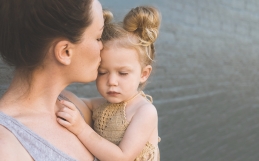When you comfort your child when he is afraid, you help him feel safe. This feeling gives him the courage he needs to eventually confront and overcome his fears. Every child fears something at one time or another, whether it be thunder, big dogs, bees, being in the dark, or imaginary things like monsters under the bed …
Moreover, some children are naturally more fearful than others: it’s part of their personality. These are mostly children from 3 to 6 years old because their ability to imagine frightening situations and remember them increases during this period.
MAKING HIM FEEL SAFE
It is important to sit down with him and discuss his fears.
Remember that his fear is real, even if you do not really know what frightens him or even if you think it should not scare him. You must take it seriously. Saying : “Do not be ridiculous! This is only a clown!” will not help him overcome his fears. Instead, you can get away from the situation with your child to make him feel secure and observe it with him. You can talk to him about what the clown is doing, the reactions of other children, the different aspects of his disguise, etc.
One should never force a child to face something that scares him before he is ready to do it. When you feel that your child is able to confront his fears, encourage him gently, putting him gradually into contact with what terrifies him.
If you seem worried when your child panics, it may be that you accidentally renforce his fears, giving the impression that there really is something to worry about. Sometimes, all you need to do is to comfort him in the appropriate language for his age, speaking in a calm and reassuring tone.
Prepare your child for things that you think might scare him. For example, if you plan to visit a friend who has a dog, talk about the animal before arriving to the location. Reassure him, saying, “This dog is nice and loves children.”
Keep reminding your child about the things he is no longer afraid of. This will help him to feel more confident and realize that he can overcome other fears.
FREQUENT FEARS
He is afraid to get away from you
These reactions are often associated with separation anxiety. Ask yourself if you are not overprotecting him. Do you tend to worry when he leaves to play at the park? If this is the case, he feels it and reacts accordingly.
What to say : “You have nothing to fear, you can go away, I’m looking at you.”
He is afraid of the dark
Again, fear related to separation anxiety plays an important role. It is therefore essential to reassure him. You can give him a small nightlight and organize rituals you repeat every night.
What to say : “You can rest without worry, we are nearby and we take care of you.”
He is afraid of noises
Unusual noises can awaken anxieties related to facing the unknown. Do not make fun of his fears and explain why he has nothing to worry about. Be careful not to isolate him from these noises. Whatever the cause of his anxiety is, avoidance helps to strengthen those fears.
What to say : “I’m vacuuming to clean the house, do not worry, it’s normal for it to make noises.”
















